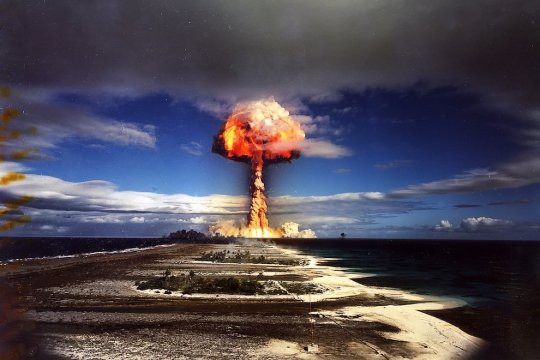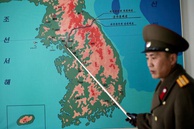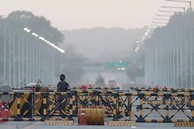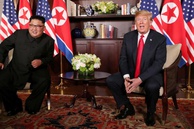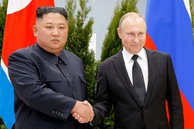The ever-increasing talk about how the current confrontation could spill over into an exchange of nuclear strikes has become a very unnerving sign of the summer of 2024. The clouds of conflict are swelling, the tension is thickening and the distance between words and deeds is shortening, while the Doomsday Clock shows just seconds until the end...
I’m just tempted to say – “We’ve lost our fear!” And you know what? Maybe we have. Therefore, before we look again at how this growing tension is assessed on both sides of the conflict - both here and there, in the US and NATO, i.e. in the collective West - it makes sense to recall how things stood with the global nuclear threat 60-70 years ago. And compare both the quality of the elites on both sides of the “Iron Curtain” that was lowered between the Soviet Union and the United States (and NATO as a whole), and the state of mind of the current Western leaders who “lost fear” or simply did not sense it at all for very specific reasons.
So, let's start with the mid-twentieth century, when the Americans dropped nuclear bombs on the Japanese cities of Hiroshima and Nagasaki. Over time, however, it became clear that it was not the Americans’ Japanese enemy whom they had been fighting in the Pacific, who was the target of those demonstrative nuclear strikes, but the USSR, which, all of a sudden, turned from America’s “ally in the anti-Hitler coalition” into the “main adversary,” as was stated in the founding documents of Washington’s “armed wings” - the Pentagon and the CIA.
At first, after August 1945, when America already had a nuclear bomb and the Soviet Union was still busy creating its own, the Yankees felt pretty much safe separated by two oceans - the Pacific and the Atlantic, as no Soviet plane, even with a nuclear bomb on board, was able to reach America’s shores without being spotted and shot down. The US felt safe! And what I especially want to emphasize here is that their sense of their own invulnerability is very important for assessing further events.
How America’s sense of security turned into... panic
With atomic weapons now at their disposal in the 1950s, the Americans kept hatching plans for nuclear bombing of the Soviet Union. The best known of those plans, dubbed “Dropshot,” envisaged a series of strikes on dozens of Soviet cities from NATO airfields in Western Europe, Turkey and the countries of the Middle East, which still remained British colonies. And this whole orgy of planning continued exactly until October 4, 1957, when the Soviet Union launched into orbit the world’s first satellite! On that October day, Washington realized that “the Russians have the means to deliver their atomic bomb directly to the United States by rocket.” Adding insult to injury, the then-Soviet leader Nikita Khrushchev told the Americans, “We will bury you” and “We’ll show you Kuzka’s mother” in the form of our nuclear missile over America. This is when, at the end of the 1950s, the Americans panicked.
I heard from my father, who then worked at the USSR Mission to the UN in New York, about sirens often wailing over the city on the Hudson, and over other big cities, warning of a missile danger. The streets turned empty as people were rushing to bomb shelters. Mobile stands, like this one below, showed people where to run:
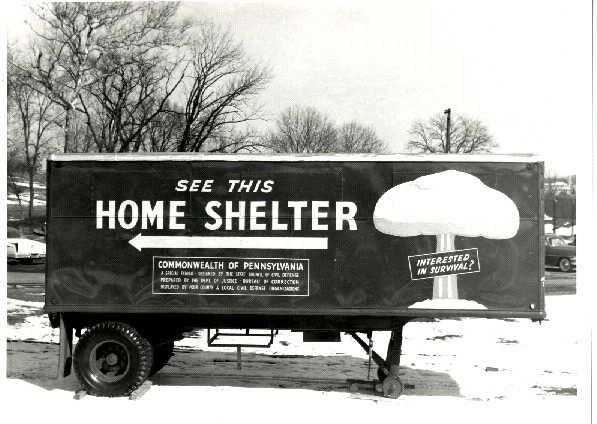
As the poets say, “fear filled the Americans’ hearts.” Business was quick to cash in on the people’s fear, and companies building anti-nuclear bunkers flourished. At the turn of the 1960s, hundreds of companies popped up across America that, for a decent amount of money (many Americans took out loans to buy space in a bomb shelter!) provided people with safety from Russian missiles. Funny? No, they didn’t find it funny then at all, and in the early 1960s, especially during the Cuban Missile Crisis, the Americans, gripped by panic, bought themselves about 200,000 such bunkers, which would make the Fuhrer of the German nation salivate. As we know, Hitler adored the conditions of underground security. This didn't help him though...
Amid all that hysteria and panic caused by the Soviet satellite, the United States even focused on creating a centralized system of nuclear shelters, with the US Atomic Energy Commission issuing a set of recommendations on what to do in the event of a nuclear strike.
Propaganda latched on churning out a plethora of local TV programs about “how to protect yourself against Russian strikes.” During the 1950s, beauty contests “Miss Atomic Bomb,” “Miss Radiation” and “Miss Atomic Explosion” were held. Here is Lee Merlin (“Miss Atomic Bomb - 1957”) posing in a swimsuit with a nuclear mushroom made of cotton wool. The photo went viral nationwide and the swimsuit came into fashion. Business done on fear!

Herman Kahn, a RAND Center analyst, then proposed building a shelter city under Manhattan for four million people. Newspapers published instructions on what one needed to bring to a bomb shelter in order to survive:
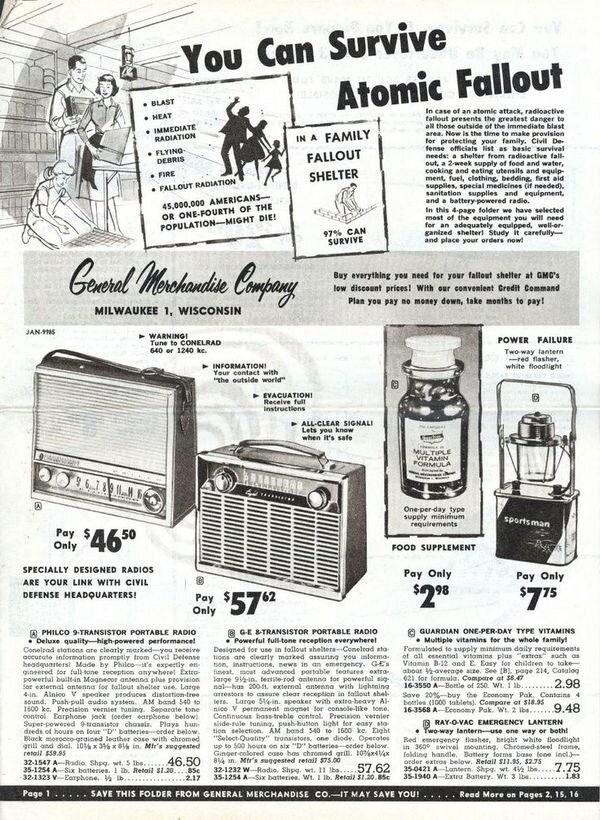
In the USSR, we also had a song back then with the words: “To a Sunny World - Yes! Yes! Yes! To a nuclear explosion - No! No! No!" The anti-war play “Rock ‘N Roll at Dawn,” written by two famous Soviet international journalists Thomas Kolesnichenko and Vadim Nekrasov, and staged by the Gogol Theater was all the rage in Moscow. The main character, an American, in a fit of panic over an imaginary “Russian nuclear strike,” eventually jumps out of the window. And this was not a stretch though, as the authors used the true story of former US Defense Secretary James Forrestal, whose fear of the “Soviet threat” drove him crazy and forced him to jump out of the window of a mental hospital screaming: “The Russians are already here!”
What made the play all the more attractive to the public was that it used music from the famous rock opera “Jesus Christ Superstar.” That was something new for Moscow! By the way, the Russian translation of the text of the JCS for that production was done by the author of these lines, who was then beginning his professional career under the guidance of two wonderful journalists - my senior comrades and mentors - Thomas Kolesnichenko and Vadim Nekrasov…
Back in those days, the horrors of World War II were still fresh on the minds of many people in Europe, and the anti-war movement was not on paper, but out in the streets. Taking part in one such antiwar rally was none other than… the present German Chancellor Olaf Scholz. In this 1983 photo made in Bonn, the future chancellor is taking part in a rally against the stationing of US military forces at Ramstein Air Base. Irony of history:
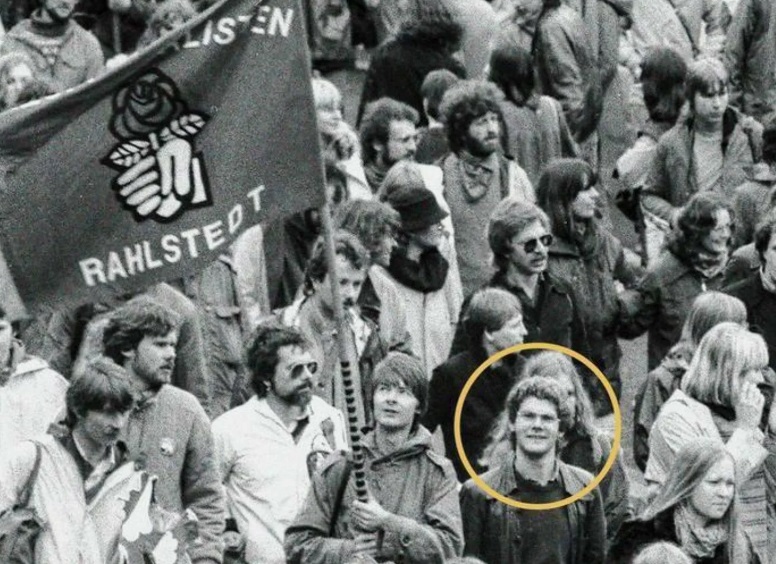
So, the threat of a nuclear war was a big issue on both sides of the Iron Curtain. But people on the other side of the Atlantic worried more, sensing their unexpected vulnerability...
The movie that comes back 60 years later
Caught in this whirlpool of emotions, America’s cinematic genius, Stanley Kubrick, created his anti-war satirical utopia “Dr. Strangelove: or How I Learned to Stop Worrying and Love the Bomb.” There, the satire was really scary, and the film showed the thickening atmosphere of the Americans’ fears of a possible nuclear apocalypse. In his film, Kubrick used documentary footage of the bombings of Hiroshima and Nagasaki to give the viewers a sense of belonging to the victims. He actually spiced up the topic sowing even more fear in the hearts of the public, who had already gotten used to running for cover from the howl of sirens over US cities...
Not only did this film made such a big buzz then, but people suddenly remembered it today!
In early 2024, an article in The Los Angeles Times, (right next to Hollywood), recalled the film's twists and turns with a nod to today's political reality: “An artifact of 1960s Hollywood that feels as fresh today — fresher, even — than it did the day it opened. Not much has changed in American politics in 60 years. If anything, we seem to be regressing…”
What does the phrase “we are regressing” mean? Back then, the United States really feared a nuclear war. Now, judging by the recent sentiments in the local establishment, the Americans’ fear remains somewhere out there - in the depths of history. It looks like the reason for this transition from the fears of the 1950s to the loss of a sense of danger by the 2020s is the generation change. Members of today's US establishment, who entered politics during the 2000s, were weaned on the “Cold War victory” over the Soviet Union. They no longer believe that there could be some serious threat coming from Moscow. During his 2015 State of the Union address, Barack Obama announced, “Russia’s economy is torn to shreds.” He was sure of this, just as those who had prepared his address. No one around him even bothered to double-check the veracity of this statement. They had been comfortably used to think... Well, exactly what Alexander Pushkin once wrote: “I myself am glad to be deceived!”
On the other hand, despite the current lackluster state of their economy and society, as the entire world business press - from Bloomberg to The Financial Times – writes, the Americans still believe they are on top of it. During the recent debate with Trump, President Biden declared this: “We have the fastest-growing economy in the world; it is a reason why we have the most successful economy in the world!” Is it so? However, this has already become a matter of faith for them, not a sober assessment of the current state of affairs.
And so, since the early 1990s, when the medal “For Victory in the Cold War” was issued in the United States, the Americans have completely stopped worrying about a possible “threat from the East”, i.e. from Russia. Mentally, they still live in the time when the world became unipolar, and almost all countries began to bow to the hegemon. The Yankees basked in this illusion, pleasant in all respects...
U.S. Illusions. It's time to part with them...
Times have changed, the situation has changed too, but these pleasant illusions haven’t gone anywhere. For example, the Russian newspaper Argumenty Nedeli brings excerpts from US military posts on social networks: “Russian and Chinese leaders are predictable for Americans. The US is 100% confident that they will never give the order to destroy the US. You can bluff with them as much as you like. You can always say ‘we’re upping the ante.’ Let them think that the United States has a royal flush in its hands - that is, the highest combination of five consecutive cards of the same suit. Even though it is not there.”
As a result of such bluff, Washington’s political and military youth, who have not smelled the post-war air of the 1950s-60s, behave very self-confidently and assertively, jeering at Biden! The famous American investigative journalist Seymour Hersh, who always had excellent insight from Washington’s high and mighty, feels confused. He even made this alarmist article of his available to everyone, not just paid subscribers of his site - let people know! In this article, Hersh sounds very emotional: “...Another old family friend, whose help has been sought by Biden on key issues since his days as vice president, told me of a plaintive call from the president many months ago. Biden said the White House was in chaos and he needed his friend’s help. I have been told about the increasing isolation of the president on foreign policy issues.”
This raises a fundamental question: who actually controls the “nuclear button” in the United States? No one is talking about this. We are used to the fact that the “button” is in the hands of the President of the United States. Maybe they don’t want to emphasize that now this president is Biden with all his problems…
Meanwhile, information is leaking out from Britain, known for its provocative games against Russia, and now reeling from the prospect of losing its centuries-old leading position in world affairs, that should raise the level of global concern.
“A nuclear provocation is being prepared in Europe using a so-called dirty bomb,” British MP Andrew Bridgen said. According to him, Ukrainian special services are preparing the explosion. “This could be a dirty bomb. I mean, Ukraine has a lot of nuclear material left over from their nuclear reactors,” he said on Resistance GB. Bridgen explained that Kyiv intends, with the help of an explosion that will eventually claim tens of thousands of lives, to achieve the entry of a NATO contingent into the territory of Ukraine, accusing Russia of the blast.
This announcement was made on June 22, 2024. Did anyone shiver? No, “everything is calm in Europe” - the portfolios of the heads of the European Union, who are now being appointed for a new term, are divided there. In Germany, crowds blithely cheer for the goals scored and victories won by the participants in the European Football Championship. As for Biden, I already mentioned him above. In London, they know something, and perhaps they have something in mind.
US calls North Korea’s nuclear potential a “wild card” of Russia
The Americans began to fuss a lot after Vladimir Putin recently signed with the North Korean leader Kim Jong-un the “Agreement on a Comprehensive Strategic Partnership between the Democratic People’s Republic of Korea and the Russian Federation.” The document states in black and white that: “Striving to establish global strategic stability and a new fair and equitable international order, the Parties maintain close communication with each other and strengthen tactical and strategic cooperation." What finally brought the West to its senses and frightened it is that the two sides pledged mutual military assistance in the event of an attack on one of the Parties. This means that if the US attacks Russia, North Korea may attack the US with its nuclear missiles from the West. A serious cause for concern in Washington…
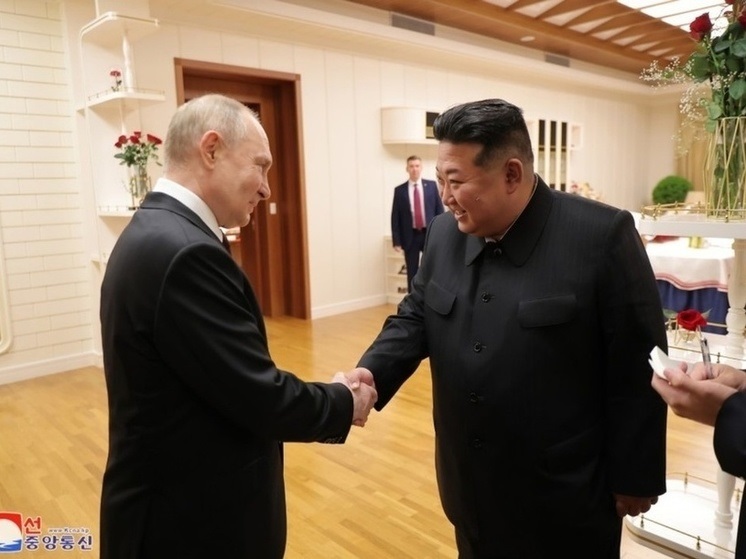
Let's get back to the Argumenty Nedeli article quoting frank statements by US military personnel posted on social networks: “Since no one knows what Kim will do in response to an open intervention by the US and NATO in Donbass, which has become part of Russia, the risks for the US and NATO from any such actions have just increased exponentially... Western leaders believe Russia is bluffing about using nuclear weapons in response to US and NATO attacks. However, these very same Western leaders believe that Kim Jong-un is unpredictable in this sense. He is a wild card with ballistic missiles capable of hitting the continental US."
They are afraid that it might come to them from where they were not expecting...
In any case, the “easy living” until recently enjoyed by America’s new political elites, who have been spared the horrors of the Second World War due to their young age, is coming to the end.
The tough position of the Russian political scientist Sergei Karaganov, who proposes to preemptively strike Western enemies with tactical nuclear weapons so that they finally realize the seriousness of the moment and step back from the brink of the Third World War, receives an unexpected boost in the form of the nuclear potential of North Korea, which the Americans themselves now call Russia’s “joker” on the global chessboard.
The Washington Post is already crying foul: “Russia and China are pushing the world toward a new nuclear arms race. And it could be even more dangerous, and more difficult to brake, than the Cold War competition that ended three decades ago. China, which has historically maintained a small stockpile of nukes, is ‘expanding and diversifying’ its nuclear arsenals ‘at a breakneck pace,’ as are Russia and North Korea. These three geopolitically aligned adversaries “are forcing the United States and our close allies and partners to prepare for a world where nuclear competition occurs without numerical constraints. All of this is deeply troubling.”
The New York Times called North Korea's rapprochement with Russia a threat to the security of the United States and its allies. And over the Black Sea, our aircraft began to “slow down” US military drones.
Until recently, life was smooth and prosperous for the United States. Suddenly, they woke up, and outside the window there was a different life. It looks like the Yankees have begun to realize something, because the frozen world of the 1990s, which was so pleasant for them, where “The Cold War has been won,” “Russia is exhausted, and its economy is torn to shreds,” “the whole world is in feet of the hegemon,” “any war from Yugoslavia to Iraq and Libya is an easy walk for US Air Force bombers,” and “the dollar is the head of everything,” is now blowing up.
Instead, rising, all of a sudden, above the horizon of the West - sleepy, well-fed and lulled by decades of its undeniable global dominance – is the specter, still unsteady, but increasingly manifested, of a nuclear mushroom that may suddenly come alive as a result of the actions of the collective West. American newspapers are starting to remember Stanley Kubrick’s film, and British experts in political destabilization are promising a “dirty bomb” in the midst of the European Football Championship!
Sergei Ryabkov: “There are people in the West who have chosen the profession of provoking an increasingly tough and brazen confrontation with a nuclear power.”
In Russia, they have long understood “where the fate of events is taking us.” At the recent Primakov Readings, the central panel was “Polycentric Nuclear World: Risks Without Control.” This is what was said there:
- Dmitry Trenin, lead researcher, Center for Global Military Economics and Strategy at the Higher School of Economics: Nuclear deterrence, which has often been talked about lately, works, but is constantly being eroded, primarily during the conflict in Ukraine. The enemy believes that it is possible to defeat Russia, a great nuclear power, in such a way that it does not resort to the deterrent that it has, but they do not understand that the actions that Russia is taking today could have dire consequences for them, and this despite the fact that the president warned about it. But the enemy just ignores this.
- Rose Gottemoeller, researcher at the Center for International Security and Cooperation at Stanford University, (US): We live in a very unusual situation. Unfortunately, politicians are currently moving away from the thesis of “indivisible security” and gravitating towards the “zero sum” thesis.
- Alexey Arbatov, Member of the Academy of Sciences: Nuclear deterrence is being eroded every day. It is being eroded by the development of new technologies, new weapons systems, which are not yet the subject of negotiations... It is also being eroded by attacks deep into the territory of the Russian Federation, such as the recent strike on Sevastopol and Russian missile attack warning systems... It is also being eroded by calls to use nuclear weapons. They even talk about their selective use and small scale, which in the opinion of those who propose this should “ensure success during combat operations”... Then a nuclear Pandora’s box opens, and, in the end, everyone loses.
- Sergei Ryabkov, Deputy Minister of Foreign Affairs of Russia: I agree with the speakers who emphasized the underestimation by our Western opponents of Russia’s readiness to stand up for itself and ensure the protection of its own interests in any situation. I don’t even want to assume that this underestimation could take on a tragic character... There are people in the West who make a career and have even chosen to specialize in provoking an increasingly tough and brazen confrontation with a nuclear power. These individuals and the ideologists of Western totalitarian domination in the world are creating the illusion of complete impunity. The answer to this can be both rhetorical and practical.
The views of the author are his own and do not necessarily reflect the position of the Editorial Board.
read more in our Telegram-channel https://t.me/The_International_Affairs

 11:22 10.07.2024 •
11:22 10.07.2024 •
